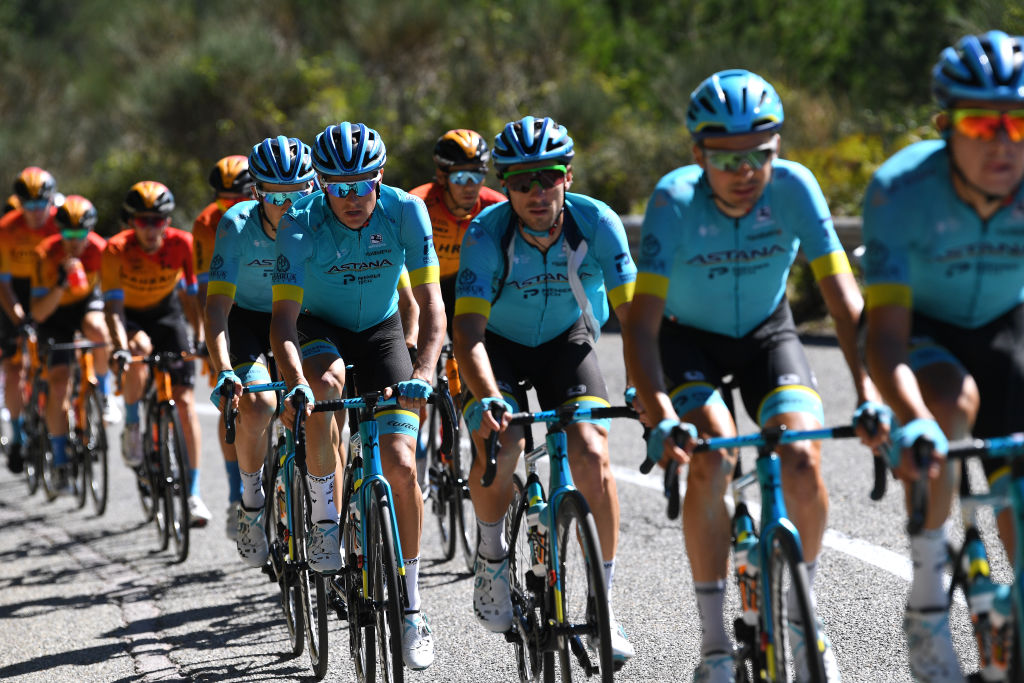Astana and Fuglsang adapt to early setbacks at Giro d'Italia
'It will be a bit of a crazy race' says Martinelli

When Jakob Fuglsang sat down for his pre-Giro d'Italia Zoom conference last Friday, there was barely room for him to squeeze onto the couch and into the video frame alongside his Astana teammates Aleksandr Vlasov and Miguel Ángel López.
Within 48 hours, physical distancing was no longer an issue aboard the Astana team bus, as López and Vlasov were abruptly forced out of the corsa rosa on successive days.
López crashed heavily in the opening time trial in Palermo, then Vlasov abandoned midway through stage 2 to Agrigento, citing stomach problems. Fuglsang had calmly batted away questions over the leadership hierarchy during that Friday afternoon conference call. By 3pm on Sunday, the point was already moot.
On paper, the triumvirate of Fuglsang, Vlasov and López made Astana one of the strongest teams in the race on the eve of the Grande Partenza in Monreale. In practice, the squad has been compelled to maintain more of a watching brief since those twin misfortunes on the opening weekend.
Astana directeur sportif Giuseppe Martinelli has guided Marco Pantani, Gilberto Simoni and Damiano Cunego to Giro victory over the years, but he struggled to recall as ill-starred a start to a Grand Tour as this. Perhaps only the 2015 Vuelta a España, when Vincenzo Nibali was expelled for a tow on the opening weekend comes close.
"It's hard, because when you're missing two riders from pretty much the first day, everything becomes more complicated," Martinelli told reporters in Castrovillari on Thursday ahead of stage 6. "You have to completely change around the roles you had thought of giving to the riders."
Nibali's expulsion from the 2015 Vuelta at least had the unintended consequence of resolving the thorny question of Astana's leadership, with Fabio Aru taking sole possession of the reins and claiming overall victory in Madrid three weeks later. Martinelli insisted, however, that the departures of Vlasov and López had not altered Fuglsang's status, but simply diminished the supporting cast around him.
The latest race content, interviews, features, reviews and expert buying guides, direct to your inbox!
"The start of the Giro was certainly a bit difficult, but we have a leader in Fuglsang, and it's always been him," Martinelli said. "That's our plan and we're going ahead with it."
Martinelli admitted that a full-strength Astana might have been tempted to test their rivals' mettle on the long and dank haul through the rugged terrain of the Sila on stage 5. With just five riders around Fuglsang, however, the team opted for caution. "A long day for almost nothing," said Fuglsang, who came home safely in the maglia rosa group. He lies 7th overall, 1:19 behind leader João Almeida (Deceuninck-QuickStep).
"Yesterday, if we'd had Lopez and Vlasov, we could certainly have done something different, but we're adapting," Martinelli said. "In the final week, it will really be a very hard Giro, so right now we're looking to save energy by doing the bare minimum. There are obviously very strong rivals. [Geraint] Thomas is missing now, but the others are still there."
Crazy race
Fuglsang has responded well since his effort in the opening time trial was compromised by the wind conditions. Together with Nibali, the Dane was part an elite group of favourites on the summit finish at Etna on stage 3, and he was even to the fore in the fast finale in Matera on stage 6, working to tee up his teammate Fabio Felline for third place behind Arnaud Démare.
"It's an honour that he was working for my sprint," said Felline, who has been, together with Manuele Boaro, Fuglsang's key domestique in the opening phase of the race. The team has tried to hold Rodrigo Contreras and Jonas Gregaard in reserve, Martinelli explained, because they were only drafted into the squad at the last-minute after Yuriy Natarov and Vadim Pronskiy as a precaution due to their close contact with a coronavirus case.
Indeed, therein lies a potentially defining feature of this rescheduled Giro. With Geraint Thomas (Ineos) already out of the race and Simon Yates (Mitchelton-Scott) almost four minutes down overall, it appears that no one team has the strength in depth to control the race. The race's novel place on the calendar has seen to that. The brutal third week could produce some anarchic racing, regardless of the conditions in the high mountains in late October.
"I've said from the first day it would be hard to do this Giro in October because the teams are at the end of the season. Yes, the season was shorter than usual, but there weren't many seasons as intense as this," Martinelli said.
"Teams have come here with what they had. A lot of changes were made to find the 7th or 8th rider for the Giro, because some teams were thinking about the Vuelta, you understand? So I think it will be a bit of a crazy race. In the last week, we'll see all sorts."

Barry Ryan was Head of Features at Cyclingnews. He has covered professional cycling since 2010, reporting from the Tour de France, Giro d’Italia and events from Argentina to Japan. His writing has appeared in The Independent, Procycling and Cycling Plus. He is the author of The Ascent: Sean Kelly, Stephen Roche and the Rise of Irish Cycling’s Golden Generation, published by Gill Books.